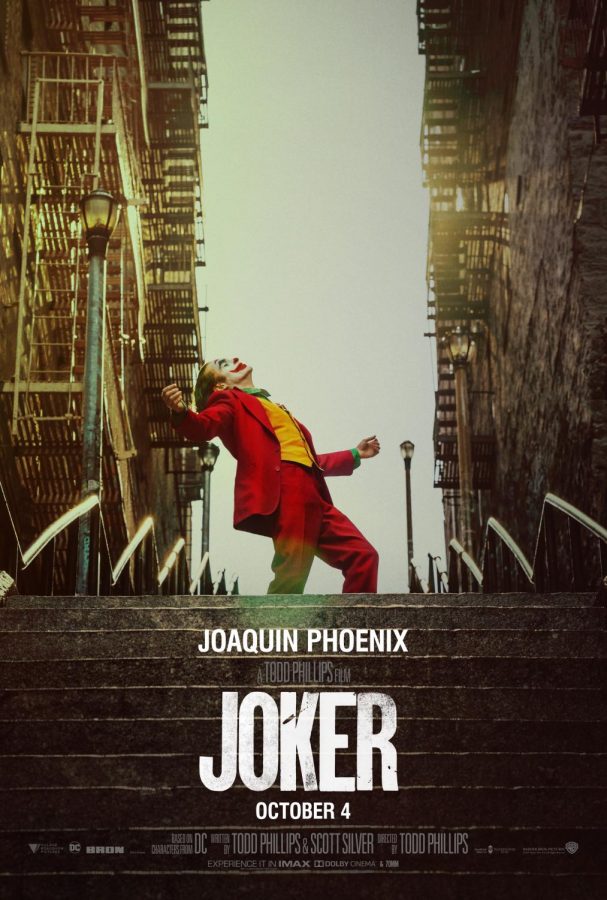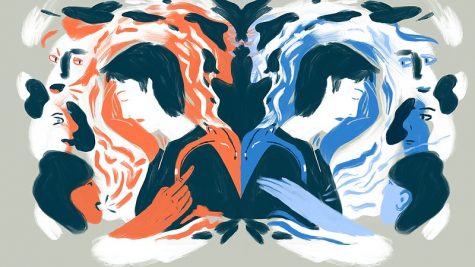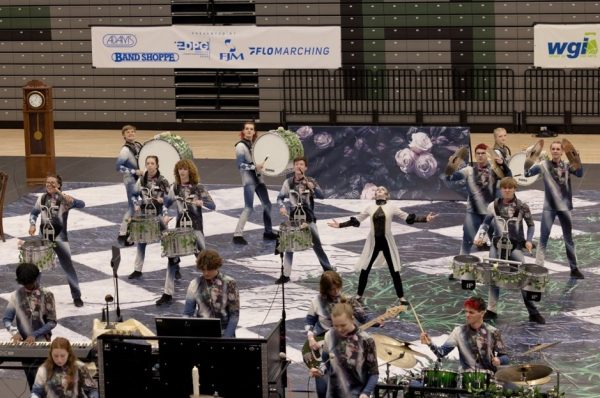Joker brings “humor” to a mad world
The Joker movie has made 205 million dollars at the box office as of 10/14/19
The Joker: a homicidally insane clown, a disillusioned trickster, and infamous character in Gotham City… or perhaps a man pushed to the edge by a society that neither cares for or accepts him.
In this unique take on the classic character from the DC universe, Arthur Fleck, a man suffering from a variety of mental health issues, is pitted against an increasingly disjointed society. As Arthur unsuccessfully attempts to cope with his divided and isolating environment, along with the suffering it causes him, the Joker is born.
This is a stark contrast to previous Joker films, which so often portray the Joker as a villain with no regard for human life. Yet this iteration pursues a more human approach, attempting to generate rapport with the audience, making them feel sympathy for a character whose previous incarnations are wholeheartedly evil. It is this dynamic which makes this Joker feel real, and that Arthur could be among us today.
Outside of his depressing apartment complex, chaos is unraveling as the disconnect between politicians, the rich, bureaucrats, and the common man who are living paycheck to paycheck reaches a climax. This tense back drop shapes the way the Joker is perceived by the public.
The public of Gotham embraces him as a political figure, despite Arthur being inherently anti-political. This creates an irony, as there is also a disconnect between what Joker stands for and what the public believes him to stand for.
The conflict also connects to the modern world, especially in the realm of comedians and Hollywood where it has become overwhelmingly common for established comedians and actors to condemn new upcoming artists for jokes that are very close in nature to jokes they themselves have priorly made. This dictation of what is and is not an appropriate subject for a joke has prevented the progression of ideas and subsequently closed the door on many comedians that came after them. It also creates barriers for the common man to express themselves, as Joker later alludes to in the film.
The overt politicization of issues people typically connect over cause many conflicts. Police, who are typically seen as protectors of the everyday civilians, are vilified and seen as pawns for big politicians, and jokes intended to relieve stress among people are interpreted to be politically charged. For Arthur, who simply wants to make people laugh, this becomes a huge dilemma, but in the long term, this tension and discontent in society becomes the reason he becomes accepted.
Only in specific circumstances can a figure like the Joker be adopted as a representation of the common man, which makes the film a reflection of our own society, which is similarly troubled by the disconnect between the common man and the bureaucracy which rules them, along with the complex issues that we face in our lives. Ultimately, this is what makes the Joker such a sympathetic character and allows the audience to tolerate his horrific acts of violence.
Moving on from the societal implications of the Joker, Joaquin Phoenix plays his role as the Joker incredibly. The acting and emotion he brings is superb and audiences will find themselves loving and hating him at every turn. Additionally, Joaquin brings an authentic sense of humanity to the character and makes you feel like you’re watching these events unfold through a real person who is experiencing them.
On a cinematic level, the film is a masterpiece. It creates an enveloping atmosphere of unease that will linger long after you leave the theater. Every scene and camera angle is shot in order to create a sense of creepiness and to stress Arthur’s isolation from those around him. It also has a certain uneasiness which grows as the film progresses.
The pacing is very good at keeping the story fluid, and the use of music creates a wide range of emotions ranging from melancholy orchestra tunes to tense and scary beats, as well as cheerful pop tunes.
The sets used are incredible and extraordinarily detailed. Arthur’s workplace comes across as depressing and rundown, making you feel bad for the conditions he deals with on a day to day basis, while his apartment appears cramped, filthy, and overall demoralizing. Gotham Square, which was large and detailed, appears to be filtered in a blue light to make it appear bleak and unwelcoming.
However, no movie is without flaws, and the Joker film attempts to handle too many social and individual issues at once. This is used as an aspect of the film to create tension and imitates life’s troubles by building up multiple conflicts at once. This allows the audience to perceive how overwhelming life can be, but at the same time packing so many issues into one film may have stretched it too far and ultimately taken away focus from the overall theme and occasionally makes it difficult for the audience to decipher the films purpose.
Despite its shortcomings, Joker is certainly a movie worth watching and brings powerful and relevant insight on the society we live in.
Your donation will support the student journalists of Fossil Ridge High School. Your contribution will allow us to purchase equipment and cover our annual website hosting costs.

Brent Jones is a senior staff member at Fossil Ridge High School. Born in Atlanta, Georgia, Brent moved to Fort Collins with his parents and brother three years ago. Although the move wasn’t easy, Brent has since adapted and joined several clubs and organizations at Fossil such as DECA, National Business...

Senior, Lily K has been involved in Journalism independently for Etched in Stone since last year. She loves writing opinions and thinks english is her superpower. K is passionate about journalism because she values honesty and the truth.
She is very connected to her family, believing that family is...













